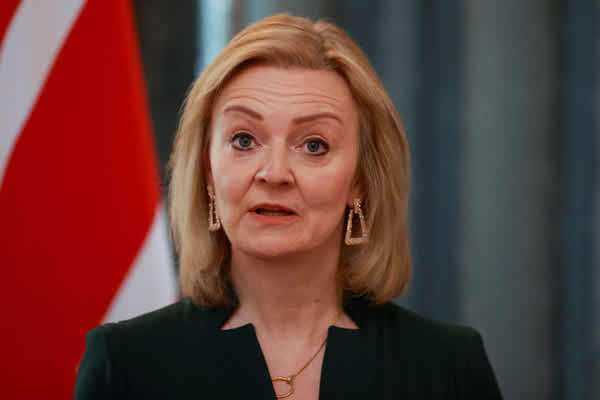
The UK is ready to escalate sanctions against Russia in the event of a full invasion of Ukraine, the foreign secretary has said.
Liz Truss defended criticisms of measures announced by the government on Tuesday, describing them as “severe”.
She said it was important to keep further sanctions “in the locker”.
Russian President Vladimir Putin has ordered troops to be sent into two Ukrainian regions held by Russian-backed separatists.
On Tuesday Prime Minister Boris Johnson announced sanctions against Russia in response, with five banks having their assets frozen, along with those of three Russian billionaires who will also be hit with UK travel bans.
But a number of MPs, including some Conservatives, have called for tougher measures, with shadow foreign secretary David Lammy saying the “mood of the entire House of Commons was that the government wasn’t being strong enough”.
Downing Street will hold a summit later with finance chiefs and regulators to discuss how to make sanctions effective.
It is also anticipated that Mr Johnson will outline more military support for Ukraine later today.
‘Turning up the heat’
Speaking to BBC Breakfast, Ms Truss said the sanctions were the most severe the UK had ever placed on Russia.
“The sanctions we’re putting in place are coordinated with the United States, they’re coordinated with Europe, to make sure that Vladimir Putin cannot play divide and rule amongst the allies.
“We’ve shown we are united and we will escalate those sanctions in the event of a full invasion into Ukraine.”
Ms Truss said she believed Mr Putin was “hell-bent on invading Ukraine” and that this was a long-standing plan.
She also reiterated comments made by Mr Johnson that football’s Champions League final should no longer be held in the Russian city of St Petersburg.
Ms Truss also defended donations made by Russians to the Conservative Party, saying there was a distinction between those who had moved to the UK years ago and those who were actively supporting Mr Putin’s government.
She was shown a picture from May 2019 which showed her, former prime minister Theresa May and other cabinet ministers at the time with Lubov Chernukhin, the wife of a former Russian minister who has been financially linked to people who were close to the Kremlin.
Mrs Chernukhin has been one of the Conservative Party’s biggest donors. Her lawyers say the donations are not tainted by Kremlin influence.
Asked if she was embarrassed by the picture, Ms Truss said “no, I’m not”.
Writing in the Times, Ms Truss said the government has a “long list of those complicit in the actions of the Russian leadership”, adding that if Mr Putin refuses to pull back troops, the UK can “keep turning up the heat” by targeting more banks, wealthy individuals and significant companies.
They include sanctioning Russian parliamentarians – which would require new legislation – and preventing British firms from doing business in the two rebel-held areas in Donetsk and Luhansk, recognised by Russia as independent.
Ms Truss also said the UK would restrict the Russian state and key companies from raising funding in UK financial markets, as well as ban a range of high-tech exports to Russia, “degrading the development of its military-industrial base for years”.
In a statement released on Wednesday, Ms Truss reaffirmed the UK’s commitment to guarantee up to $500m (£368m) in loans to Ukraine to mitigate the economic effects of Russian aggression.
Shadow foreign secretary David Lammy said Russia should be cut out of the global financial system Swift, with greater efforts made to damage the Russian currency, including removing the country from the UK’s currency markets.
“If we’re serious we’ve got to go hard,” he said.
Lord Kim Darroch, a former UK ambassador to the US, said the UK’s sanctions appeared “pretty modest” compared to the EU’s and particularly Germany’s, but he understood the desire to “hold some things back” to deploy in the event of an escalation.
Former Foreign Secretary Jeremy Hunt said the government needed to take action that Mr Putin is not expecting, adding that a key aim should be to reduce the ability of the Russian state to finance its military.
Tom Keatinge, director of RUSI’s Centre for Financial Crime and Security Studies, described the UK’s sanctions as “essentially taking a pea-shooter to a gun-fight”.
Perhaps the biggest penalty Russia has faced so far is the decision by German Chancellor Olaf Scholz to halt approval of the Nord Stream 2 gas pipeline under the Baltic Sea, a €10bn (£8.4bn) project which had been expected to allow Russia to sell more natural gas directly to Europe.
The US and EU have both introduced a range of sanctions, including restricting the Russian state from financing its debt from their banks and banning their own companies from trading with the two rebel-held regions.
They have also targeted key Russian individuals and organisations with sanctions.
Source: BBC























